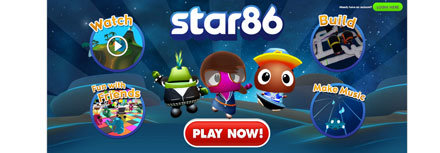
The company that started out as Podscape and created the kids’ gaming world Big Little Bang has a new identity and is developing more games for tweens and teens.
The new mantle is Drumleaf — and Star86, the new name for its flagship offering Big Little Bang, gives kids across the internet a suite of tools to make and perform music, interact socially, get feedback, set challenges and make YouTube videos using in-game video cameras.
Now the company is building out its suite of web and mobile games for kids. Its second title is Universe City, which founder and CEO Chris White says is an education-focused game for kids slightly younger than that targeted for Star86.
He adds there are a couple of others in the pipeline aimed at tweens and teens.
The name changes are one of many that show Drumleaf, like any good startup turned grown up company, is in close touch with the market. It swapped Big Little Bang to avoid confusion with the kids’ action adventure game Little Big Planet, whose developer was acquired by Sony in 2010.
And it was market validation that showed the audience for the game was older than the 7-11 year olds the company was originally targeting when it launched, says White.
Star86 evolved after White, during post-graduate study at the University of Auckland, entered the idea in the Spark business ideas challenge in 2007.
Through the challenge he met Icehouse CEO Andy Hamilton and became a resident in the business growth centre. Since then he’s attracted big names and key investments: among the directors are digital entrepreneur Claudia Batten, who is its chair, managing director of games companies PikPok and Sidhe, Mario Wynands, and Hamilton.
It’s had investment from Sparkbox, the New Zealand Venture Investment Fund, the Icehouse and K1W1.
It’s also reached half a million users, mainly in the US and UK, and has 15 staff across the US and New Zealand. Drumleaf is now working with the University of Auckland to research how game mechanics can improve children’s self confidence and combat bullying.
“That makes them more responsive to the things they feel that might lead to depression and anxiety and open to learning about what they’re passionate about,” White says. “We’re looking to raise the bar for the whole industry by publishing our results to be used by other kids games to increase the benefits of gaming.”




